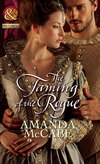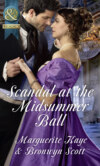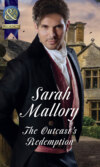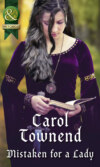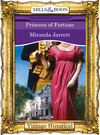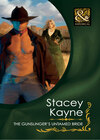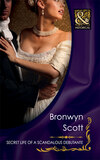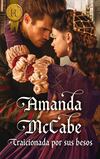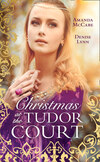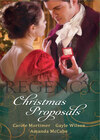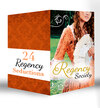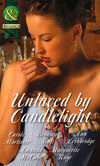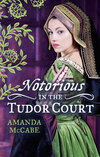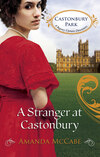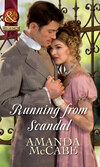Kitabı oku: «The Taming of the Rogue», sayfa 3
Anna smiled up at him. He was so good at seeking out pleasure, it seemed, at drawing out every hidden morsel of joy in their striving, heaving existence. What was that like? What would it feel like to let go of control and duty for one mere moment and just—be?
She feared the cost of that one moment would be too high. But it was tempting, nonetheless, especially when he looked at her like that under the shimmering moonglow.
‘Perhaps we do need to stop and glance at the stars once in a while,’ she said. ‘Lest we forget they are even there at all.’
‘It’s difficult to see them in the city,’ Rob said. He sat down beside her, his shoulder pressed very lightly against hers. He did only that—sat beside her—and yet she was so very aware of the hard, lean line of his body, the heat of his skin on hers through the layers of their clothes, the raw strength of him.
‘I’ve never lived anywhere but London. Not for long anyway,’ Anna said. ‘This is the only sky I know.’
‘When I was a lad I lived in the countryside,’ he said. His voice was quiet in the darkness, as if suddenly he was far away from the garden. Somewhere she couldn’t quite see or follow.
‘Did you?’
‘Aye, and often on summer nights I would slip out of my bed and go running down to the river, where there was only the water and the sky, perfect silence. I would lie down in the tall grass at the riverbank and stare up at the stars, making up tales for myself of other worlds we could not see. Wondrous places beyond the stars.’
Anna was fascinated by this small glimpse of Rob’s past, his hidden self. She had never thought of him as a boy before; he seemed to have just sprung up fully formed onstage, sword in his hand, poetry on his lips.
‘You must have been the despair of your mother, running away like that,’ she said.
He smiled at her, a flash of his usual careless grin, but it swiftly faded. ‘Not at all. My mother died when I was very young. Our aunt then stayed with us for a time, but she cared not what we did as long as we didn’t dirty her nicely scrubbed floors.’
‘Oh,’ Anna said sadly. ‘I am sorry.’
‘For what, fair Anna?’
‘For your losing your mother so young. My own mother died when I was three.’
Rob studied her so carefully she felt a warm blush creeping stealthily into her cheeks. She was very glad of the cover of darkness—the moon was behind the clouds. ‘Do you remember her?’ he asked.
She shook her head. ‘Not very much at all. She would sing to me as I fell asleep at night, and sometimes I think I remember the way her touch felt on my cheek, or the smell of her perfume. My father says she was very beautiful and very gentle, that there could be no lady to compare to her and that is why he never married again.’ Anna laughed. ‘So it seems I inherited little from her, having neither beauty nor gentleness!’
‘I would disagree—about the beauty part, anyway,’ Rob said, his old light flirtatiousness coming back, encroaching on their fleeting moment of intimacy.
‘I am not gentle?’
‘Gentleness is quite overrated. Spirit—that is what a man should always look for in a female.’
Anna thought of the weeping whore in her tattered yellow dress. She had not seemed especially spirited, but then Anna hadn’t seen what had come before the morning quarrel. Maybe the night had been spirited, indeed.
Had it all only been that morning? It seemed like days ago, so very distant from this quiet moment.
And she felt a most unwanted twinge of pleasure that he might think she was spirited—and beautiful. Even though she knew very well it was only a mere flirtatious comment—a toss-away he no doubt said often to many women. But she had long ago lost her youthful spirit. It was buried in the real world.
‘Surely spirit can cause more trouble than it is worth?’ she said sternly. ‘For instance—how is your shoulder tonight?’
He flexed his shoulders as if to test them before answering her. His muscles rippled against the fine fabric of his doublet.
‘Better, I thank you,’ he said. ‘I had a very fine nurse.’
Anna waited to see if he would say more, tell her how he had come to be wounded in the first place, but he did not. A silence fell around them, heavy and soft as the night itself. She let herself lean closer against him, and didn’t even move away when his arm came lightly around her shoulders.
‘Tell me about those worlds you saw beyond the stars,’ she said. ‘Tell me what it felt like to escape there.’
‘Escape?’ he said. She could feel the way he watched her in the night, so steady, so intense, as if he wanted to see all her secrets. ‘What do you want to escape from, Anna?’
Everything, she wanted to say. At least for that one moment she wanted not to be herself, here in her workaday life, her workaday self. She wanted him to be not himself, either. If only they were two strangers, who knew nothing of each other or of what the world held beyond this garden.
‘It’s more what I want to escape to, I think,’ she said. ‘Something beautiful, clean and good. Something peaceful.’
‘Something beautiful?’ he said. ‘Yes. I think I’ve been looking for that all my life.’
Anna felt the sudden gentle brush of his hand against her cheek. His touch was light, and yet it seemed to leave shimmering sparks in its wake across her skin. She reared back, startled, but he didn’t leave her. His palm cupped her cheek, holding her as if she was made of the most fragile porcelain, and she swayed towards him.
Slowly, enticingly, his hand slid down her throat to the ribbon trim of her neckline. He toyed with it lightly between his fingers, his dark gaze following his touch. He didn’t even brush the bare, soft swell of her breast above the unfashionably modest bodice, yet she trembled as if he did. She felt unbearably tense and brittle, as if she would snap if he did not touch her.
‘Why do you always wear grey?’ he asked, twining the bit of ribbon between his fingers.
‘I—I like grey,’ she whispered. ‘‘Tis easy to keep clean.’ And easy to fade into the background. It was a suitable colour for a woman who spent her time hovering behind the scenes.
‘In my star kingdom you would wear white satin and blue velvet, sewn with pearls and embroidered with shining silver thread.’
He stroked one long strand of her hair that had escaped its pins and trailed over her shoulder, tracing the curve of the curl. She felt the heat of his touch against her skin.
‘And you would have ribbons and strands of jewels in your hair.’
Anna laughed unsteadily. ‘That would not be very practical as I went about my tasks. I would be always tripping over the satins and pearls and getting them dirty.’
‘Ah, but in that kingdom you would have no such tasks. You would be queen of all you surveyed, seated on your golden throne as everyone hurried to serve your every whim.’
‘Gold and silver and pearls?’ she said, mesmerised by his touch, his words. ‘La, but I do like the sound of this kingdom of yours.’
He twisted his fingers into her hair and drew her close, so close she could feel his warm breath whisper over her skin. He cradled the back of her head on his palm, holding her to him.
‘You deserve all of that, Anna,’ he said. All hint of his usual teasing manner was gone, and there was only dark seriousness in his words and in the way he watched her. ‘That should be your life, not—this. Not Southwark.’
Anna felt a sharp prickle behind her eyes and was afraid she would cry. She could not do that—not here, not with him! She already felt too open and vulnerable. She tried to turn away but he held on to her, his hand in her hair. His touch didn’t hurt, but he wouldn’t let her go.
‘You know naught of my life,’ she said.
‘I’m a poet, Anna,’ he answered. ‘It is my lot in life to see everything—even that which I would rather not. And I see your sadness.’
‘I am not sad!’ Not if she could help it. Emotions, like sadness and anger and love, only brought trouble. She preferred serenity now.
‘You are, fair Anna.’ He pulled her even closer, until his forehead rested lightly against hers. She closed her eyes, but he was still there—very close. ‘I see that because it calls out to the sadness in me. We both see too much, feel too much. We just don’t want to admit it.’
Nay, she did not! She didn’t want to hear this, know this. She tried to twist away, but Rob suddenly bent his head and kissed the soft, sensitive spot just below her ear. She felt him touch her there with the tip of his tongue.
She gasped at the rush of hot, sizzling sensation. Her hands clutched at the front of his doublet, crushing the fine velvet as she tried to hold on and keep from falling. Her eyes closed and her head fell back as she gave in to the whirling tidepool of her desire. His mouth, open and hot, slid slowly along her neck to bite lightly at the curve of her shoulder.
‘Robert!’ she cried, and his arms closed around her waist to lift her onto his lap as his lips met hers, rough and urgent.
Anna had never felt so weak and strange. Something deep and instinctive, primal, rose up deep inside her, blotting out the world around her so that she knew only him and this moment with him. Only his kiss.
She felt the press of his tongue against her lips and she opened for him. He tasted of wine and mint, of something dark and deep that she craved far too much. She wrapped her hands around the back of his neck, as if she could hold him to her if he tried to leave, and felt the rough silk of his wavy dark hair on her skin.
She heard him moan deep inside his throat as her tongue met his, and the sound made her want him even more—madly so. He was so alive, the most wondrously alive person she had ever known, and she craved the heat and pulse of him. For that one instant he made her feel alive, too—free of her calm, cool, still existence.
He made her feel too much—he frightened her, her feelings frightened her. She was drowning in him.
She tensed, and Rob seemed to sense her sudden flash of fear. He tore his lips from hers, and the clouds suddenly skittered away from the moon. Its silvery light streamed down onto his face, casting it into angular shadows. For a second he was starkly exposed to her, and she saw the horror in his eyes, as if he realised just what he was doing. Whom he was kissing.
Anna felt as if a freezing winter wind washed over her, her passion turned to cold, bitter ashes around her. What was she doing? How could Rob say he saw her, knew her, when in that moment she didn’t even know herself?
She pushed him away, and as his arms slid from her body she forced herself up from his lap. Without him holding her she felt shaky and cold, but she knew she had to get away from him.
If only she could run away from herself, as well.
As she dashed towards the house she heard him call her name, yet she couldn’t stop. She just kept running—past the dining room where her father and his friends still roared with laughter, and up the narrow stairs to her bedchamber. She slammed and bolted the door behind her, as if that could keep out what had happened.
She stumbled past the curtained bed, already turned back for the night by their maid, and went to the window. It was open to let in the night’s breeze, and she could see that garden below, full of shadows and secrets.
Rob wasn’t there any longer. The stone bench was empty. Had he also fled from what had exploded between them?
Somehow she couldn’t imagine Rob Alden fleeing from anything. She didn’t know anyone who ran into danger as he did.
Anna shut the window and sank slowly to the floor, her skirts pooling around her. She pressed her hands to her eyes, blotting out the night. Soon it would be dawn, and a new day’s tasks would be before her. Soon she could lose herself in the busy noise of her life, and this would all be as a dream. A foolish dream.
It had to be.
Chapter Five
‘And this fair place, this Eden, is as nothing compared to your—your …’
Rob stared down at the words on the page, and an intense, fiery wave of anger washed over him. They weren’t right—the right words simply wouldn’t come that morning. They were imprisoned behind an impenetrable wall, locked away. There were no tender love words to be conjured that day. Not by him.
There was only that anger, burning away everything else. Anger and something he had never known before, something he despised—guilt. The conscience he’d thought he didn’t have, couldn’t afford, pricked at him like sharpened poniards.
‘Z’wounds,’ he cursed, and threw down his pen. Ink splashed over the papers scattered across his table, blotting out the words he had just written. Work was the last thing he could think of today.
Anna Barrett filled his thoughts—and created that anger.
Rob sat back in his chair and flexed his hand, the ink-stained fingers stiff from trying to write tenderness and love where there was none. He thought of how that hand had touched Anna last night, how he hadn’t been able to stop himself from giving in to the luscious temptation of her rose-scented skin, the softness of her hair.
The way her mouth had tasted against his—like ripe, sweet summer fruit to a starving man. Everything else had vanished when they were alone like that, just the two of them in the night, and he had lost himself in her. The control that was so vital to his life had disappeared as if in a puff of mist, and he’d been desperate for her.
He’d wanted, needed, the softness of her, and if they had been in a private chamber with none passing by he would surely have lifted her skirts and taken her in that rush of sudden, desperate lust.
Thank the stars they had been outside, with a houseful of people mere feet away. That Anna had come to her senses when it had seemed he had none and pushed him away.
That look of blank surprise on her face as she’d run from him had awoken him from his sensual dream as nothing else could have. The memory of it now made him even angrier—though whether at Anna or himself, or at the whole world, he couldn’t say. If only there was a brawl to be had, here and now! A fight would erase all else, burn away the emotion that ran too fast, and he could forget. For a moment.
Rob pushed back from the table so swiftly his chair clattered to the rough wooden floor. He kicked it out of the way and went to thrust open the window and let in some of the early morning light.
His rented room at the top of the Three Bells tavern looked down on one of the back alleys of the Southwark neighbourhood, so high he was above the overhanging eaves of the buildings that nearly touched above the road. It meant he had more light and air than the dank lower chambers—better for his long hours of solitary writing. The fetid smells of the dirt lane were more distant, as well, and he could think and work here. It was his sanctuary, rough and small as it was.
Today it didn’t feel like a sanctuary. It felt like a prison, binding him up alone with unwelcome feelings and desires.
Desires for Anna Barrett, of all women. Rob leaned his palms on the scarred wooden ledge and stared down at the alley below. He didn’t see the passing water-girls or the drunks straggling home from the night’s revels. He saw Anna, her full, soft lips pink and damp from his kisses, her bright green eyes wide and startled. Her body so soft and pliant against his.
Anna Barrett—the prickliest, most distant female he knew—soft in his embrace. Anna Barrett oversetting his emotions, which he had long thought mastered. Who could have thought it? Someone who shaped human ends had a sense of humour.
It was surprising, and he had thought he could never be surprised again. That alone was enticing.
But he could not afford to be enticed by Anna, or to have anything to do with her at all. If she knew the truth about him—about what he was doing at the White Heron—she would castrate him herself with a rusty stage rapier and toss his severed member into the Thames.
Rob turned away from the window and the piercing daylight that rose above the jagged rooftops, pulling his rumpled, ink-stained shirt over his head. The morning moved apace, and he had work to do.
If only today’s task was half as pleasant as being in the garden with Anna Barrett. He could easily face every danger if such a reward waited at the end.
But it was thinking like that—careless and impulsive, seeking pleasure at all costs—that had brought him to this place. It was the Alden family’s downfall, always.
As Rob splashed cold water from the basin over his face and bare chest, he thought of his family. He usually refused to think of them at all. Memories of his time before London, before Southwark, were futile and foolish. They were gone and he had made his choices. The past was no more. His parents would have disowned him for all he did now. His short stint in prison after a brawl had shown him what his life had become—how far he was from his old life. His parents would have been disappointed, indeed.
But his sister—pretty Mary, gone from him now for so long—she still lingered with him. Sometimes he seemed to sense her sad spirit at his shoulder, and it was that memory that drove him forward, that kept him alive amidst all the danger and his own careless ways. He had to do right by her, to fulfil his goal before he could let go and be at peace.
That had long been the implacable force driving him onward. He wouldn’t let Anna Barrett be an obstacle, no matter how well she kissed. No matter how much he wanted her.
Rob scrubbed hard at his face with a rough cloth, as if he could wash away last night and the emotions it had aroused in his long-cold heart. Wash away all the past. That was impossible, but he could at least make himself look a bit more respectable. Like a man with important business to conduct.
He pulled on a clean shirt and reached for his best doublet—the crimson velvet sewn with gold buttons he’d worn last night and which lay discarded on his rumpled bed. But it still smelled of roses and night air, of Anna and their closeness in the garden.
‘God’s teeth,’ he muttered, and tossed it aside. His next-best doublet, a dark purple velvet and black leather, would have to do, and was more sombre, anyway. Better for where he was going. He donned it quickly and smoothed the tangled waves of his hair before he reached for his short black cloak—and the packet of papers.
He had to journey to Seething Lane before the day was too far gone.
‘Anna, dearest? Are you well this morning?’
‘Hmm? What did you say, Father?’ Anna asked as she stared out of the window of the dining room. The garden in the morning light, with the slow traffic of Southwark waking up just beyond, seemed so—ordinary. The same trees and overgrown shrubs she saw every day. How had she ever been so carried away by dreams and fantasies in such a place? Even under night’s cover?
It was a terrible, twisting puzzle that had kept her awake until dawn.
‘It’s just that you seem distracted, daughter,’ her father said. ‘You’re about to spill that beer.’
Anna looked down, startled, to see that the pitcher of small beer she was pouring into pottery goblets was indeed about to spill. She quickly put it down on the table, and reached for a cloth to wipe up the last drops.
‘Fie on it all,’ she murmured. ‘I’m sorry, Father. I suppose I’m just a bit tired today.’
‘Sit down and have some bread,’ Tom said, pushing a platter of bread and cheese across the table to her. ‘I shouldn’t have asked so many people to supper yesterday. We talked too late into the night.’
No, he shouldn’t have asked them, Anna thought as she listlessly poked at a piece of bread. Maybe then she would have spent the evening quietly with her book, not wandering off in dark gardens with Robert Alden, forgetting herself and acting like a fool.
She felt her cheeks turn hot at the memory of their kiss, of the way she’d flung herself onto his lap and held him so tightly, as if she was drowning and only he could save her. But there had been such a feeling of inevitability about it all—like the fate that led characters in a play to their inescapable ends. Something dark and needful had been growing between them for a long time. Something she didn’t understand and didn’t want.
Anna took a long sip of the beer. Perhaps it was best something had happened. Now it was done and past, and they could forget it.
But what if it was not so past? What if it happened again and she found she truly was a strumpet with no control?
She almost laughed at the thought. Strumpet or not, she knew Rob was pursued by so many ladies—Winchester geese and fine Court women alike. She saw them all the time at the White Heron, his admirers clustered around the stage with shining eyes and low-cut bodices. He certainly didn’t need a grey-clad widow like her.
She just had to forget him—put last night’s folly down to a wild dream and move forward. It was as simple as that.
Only that didn’t seem so very simple, even in the hard light of day.
‘We will have a few quiet evenings for a time,’ her father said. ‘No more late dinners. I can meet with the actors at the tavern to read the new plays.’
‘Invite them here whenever you like, Father,’ Anna said. She refilled his goblet, careful not to spill any beer this time. ‘I do not mind.’
‘I don’t want to make more work for you, dearest, not when you do so much already. Perhaps you would like a holiday in the country?’
‘A holiday?’ Anna said, startled. Her father was a London man, born and bred; the dirty water of the Thames was in his blood. He never thought they should go to the country.
‘Aye. You seem to need a rest, and soon the hot weather will be upon us. What if the plague comes again?’
‘It won’t.’ But the country—fresh air and quiet, long walks, space to think, to be. A place away from the theatre and Rob Alden. It sounded quite enticing. But … ‘And I have too much work just now to go away.’
Thomas shrugged. ‘If you say so. But think about it, my dear. We could both use a change of scene—especially right now.’
Anna laughed. ‘You would die of boredom away from London, Father! Why this sudden urge to go to the country?’ A suspicion struck her. ‘Are you in some sort of trouble?’
‘Trouble? Certainly not!’ he blustered. But he wouldn’t meet her gaze, and his rough, lined cheeks looked red. ‘Whatever would make you say such a thing? When am I ever in trouble?’
All the time, Anna thought. Southwark was ripe with trouble around every corner—especially for men like her father, who had business concerns in every narrow street and dark corner. Yet he’d never wanted to run away from it before. He seemed to enjoy trouble.
Just as Robert did.
‘I will think about going to the country for a time,’ she said. ‘When business grows slow in the hotter weather. But for now I have things I must do.’
Her father nodded, somewhat mollified. But his face still bore that guilty flush. ‘What are you doing today, my dear?’
‘It’s rent day, and a few tenants are still behind in their payments. I’m going to visit them myself and have a word with them. You must keep a watch on the rehearsal at the White Heron, Father, or they will waste away the whole morning.’
He nodded, but Anna feared he was inclined to laze away the morning with them. She rose from her chair and kissed the top of his balding head. The old rogue—how she loved him, despite everything. He was all she had, her only family, and she was all he had, as well. She had to look out for him.
‘I will be back by afternoon, Father,’ she said. ‘Don’t worry about a thing.’
He reached up to pat her hand. ‘I don’t worry, Anna. Not while you are here.’
Anna left the dining chamber and went up to her room to fetch her hat and shawl. As she pinned the high-crowned grey hat to her neatly coiled hair, she caught a glimpse of her pale face in the small looking glass. Usually she only took a quick look, to be sure she was tidy, but today she looked longer, studied herself.
Her father had always claimed she was pretty because she looked like her mother, but Anna had never thought herself so. She saw the finely arrayed Court ladies, with their golden curls and rouge-pink cheeks, their white bosoms displayed above jewelled bodices. She saw the admiration they gathered from men, and knew she did not resemble them. Her hair, though thick and long, was brown and straight, her eyes too tilted and her chin too pointed. She was pale and thin, her gowns plain grey, as Rob had pointed out. Her lips were fine enough, but were too often pressed thin with worry.
She was not a vivid beauty, likely to catch and hold the eye of a handsome devil like Robert.
‘He must have been very ale-shot last night,’ she said, and jabbed the pin harder into her hat. Perhaps she had been, as well—or at least drunk on the moonlight and on his words, the rare glimpse he’d given her of his past.
But that had been last night. This was today, and she had work to do.
Anna looped her wool shawl over her shoulders and reached for her market basket. Her father was still at the table with his beer when she went downstairs, looking uncharacteristically sad and reflective. Something was happening with him, she was sure of it. But she had no time to puzzle it out now; the mysteries of men would have to wait. She had business of pence and pounds today, and that she could decipher and understand.
Men, she vowed, she would never fathom.
Anna was nearly to Mother Nan’s bawdy house, her first rent-collecting stop of the day, when she caught a sudden glimpse of Rob through the crowd. He was taller than most of the people passing around him, the plumes on his cap waving like a beacon, and her heart suddenly beat faster at the sight of him.
There was no time to prepare herself for seeing him again after last night, and she felt very flustered and uncertain. She hated that feeling. How dared he make her feel so discomposed?
And—and how dared he not even notice her?
As Anna watched him, pressing herself against the whitewashed wall in case he glanced her way, he kept walking quickly on his path, looking neither to the right nor the left but just straight ahead. The people around him, the crowded, quarrelling knots and tangles of humanity, made way for him as naturally as if he was a prince. They didn’t jostle him or grab his arm to entreat him to buy their wares, and no one dared try and rob him. It was extraordinary.
Yet Rob appeared to be lost in his own thoughts. Under the narrow brim of his fine cap his brow was furrowed, his expression dark as a storm cloud. There was not even a hint of reckless laughter about him, only some intense purpose that drove him onward.
Where on earth was he going? Anna was intrigued in spite of herself. In her world it never paid to be curious. Only minding one’s own tasks kept trouble away in this neighbourhood, and not even always then. And Rob always seemed to bring trouble with him.
‘Oh, what am I doing?’ she whispered, but she followed him anyway, as if her feet could no longer obey her. She hurried after him, keeping those plumes in sight as her guide. She had to be very careful not to let him see her.
She had never known Rob to be like this before, so solemn and purposeful, so lost in his own thoughts. Was he in some sort of debt or planning a crime? Or perhaps he was planning to sell his new play right out from under her father’s nose.
They left the most crowded streets behind, leaving the thick knots of people and the busy shops for the pathway that ran alongside the river itself. Luckily there were still enough people gathered there for her to stay out of sight, using them for shields. Boatmen plied their trade, looking for passengers to ferry to the opposite bank, and fishmongers announced their fresh catch.
Robert kept walking, and Anna had to quicken her steps to keep up with him. They passed warehouses, close-packed merchants’ houses, and London Bridge came into view, with the boiled heads of the executed staring down sightlessly at the crush of humanity. Rob started to cross the huge edifice and Anna realised with a sudden cold shock where he was heading—towards the silent stone hulk of the Tower.
Anna shrank back from its tall, thick walls and gates, its waving banners and the guards who patrolled the ramparts. She had never been there herself, but she had heard such terrible tales of what happened behind those blank walls. Pain and blood and fear as could only be faintly imagined in revenge plays were a reality there, and most who were swallowed up by it never returned. Even from where she stood, at a safe distance along the river, she could feel the cold, clammy reach of it.
What business could Rob have there? She could well imagine he would do something to cause his arrest. Actors were always getting into fights and being thrown into gaol, and there had been rumours he had once fetched up in Bridewell. Yet surely no one, not even a bold player like Rob, would voluntarily go near the Tower?
She hurried across the bridge herself and stood up on tiptoe, straining to catch a glimpse of him. She finally saw his plumes again, and to her relief he was not entering the dark environs of the Tower but continuing along the river on the other side. She ran after him, dodging around pedestrians to keep him in her sight as he made his way into the tangle of streets just beyond the Tower’s walls.
He went past more shops and houses, not even glancing at them. Gradually the buildings grew farther apart, with large gardens and empty spaces between them and the road, until he came to what had once been the entrance to an old Carthusian monastery. A vast complex had once lain here, covering many acres and containing churches, dining halls, scriptoriums and butteries and barns. Now there were large homes, quiet and watchful behind their new gates.
